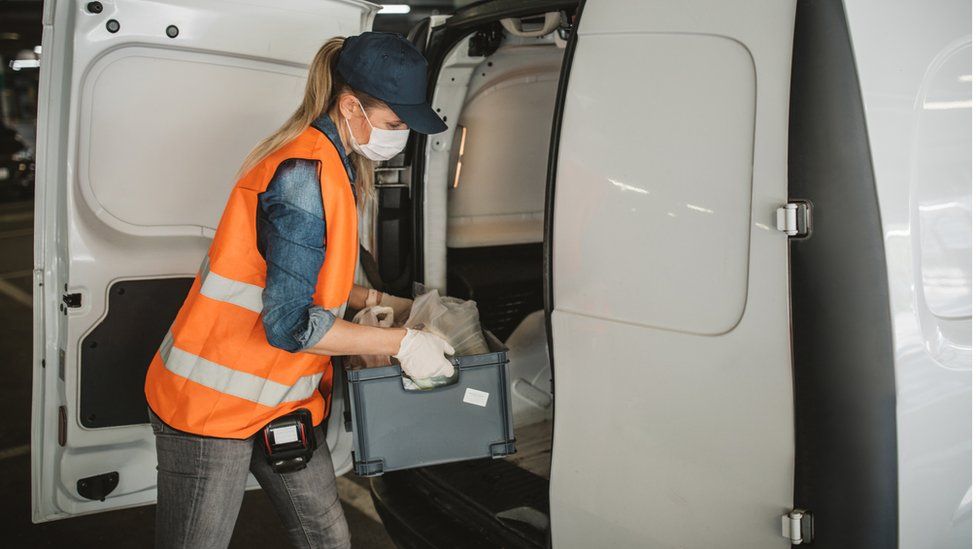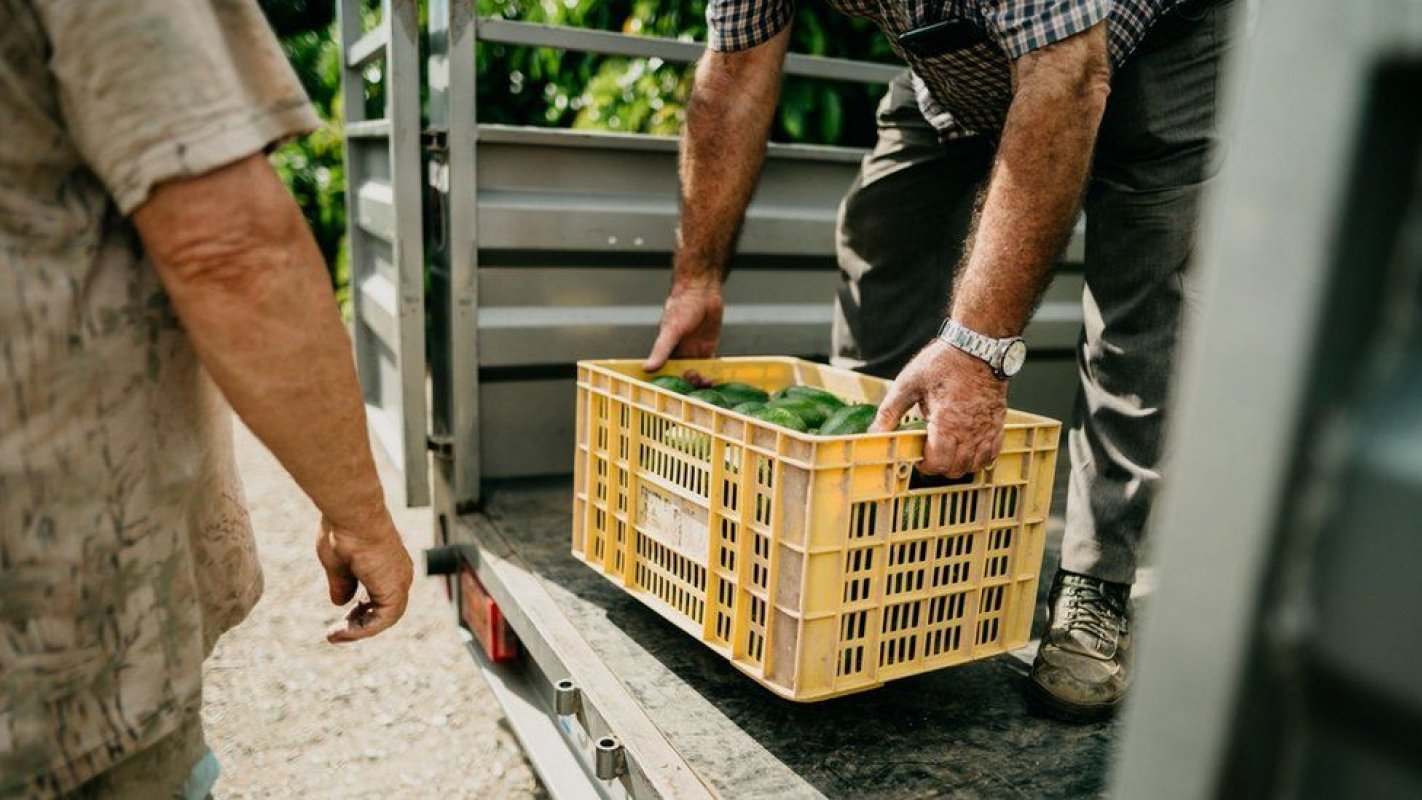Increased fuel prices will lead to people paying more for food in shops and restaurants, an industry trade body has said.
The high cost of diesel will end up being passed on to customers, the Federation of Wholesale Distributors said.
Surging fuel prices come on top of other pressures on shops including labour shortages, retailers said.
Households are facing a cost of living crisis as inflation soars.
With fuel prices hitting record levels, the trade body for UK wholesalers has told the BBC that its members will pass on increased transportation costs to their food shops and restaurant customers, who will in turn pass on those costs to consumers.
"Food price inflation is already happening, but this is going to make it worse, because there'll be charges passed on to customers and then obviously to end users as well," said James Bielby, chief executive of the Federation of Wholesale Distributors.
"So, people buying food and drink in shops, when they're eating out, will be paying more because the cost of distributing those goods to the outlet has gone up so much."
Fuel prices: Customers abusing forecourt staff as costs soar
Ukraine war: Cost of filling diesel family car hits record £90
Fuel prices are rising amid fears of a global economic shock from Russia's invasion of Ukraine.
The prices are mainly determined by the price of crude oil and the dollar exchange rate, as agreements are made in dollars.
At one point this week oil jumped to $139 a barrel at one point, the highest level for almost 14 years, before slipping slightly.

'I'm exhausted'
Philip de Ternant is managing director of Creed Food Service. His 80 lorries make 3,500 food deliveries per week to restaurants, cafes, pubs, care homes and schools across England and Wales
The cost of diesel has become a major headache. The business is paying £13,200 a week more than it was at the start of the year.
"We buy on card at fuel stations, but the majority is fuelled up on site with bunkered fuel. We're buying 33,000 litres a week on average.
"In January 2021, we were buying at 92p a litre. This January, we were buying on average £1.17 a litre. In February, on average it was £1.21."
This week, he was shocked at the cost. "We've bought at £1.55, and I've been told by our fuel wholesaler it could be £1.70 next week. "
Mr de Ternant said some diesel suppliers had told him they could not deliver until next Wednesday at the earliest, and could not say what the price would be.
He said the cost could not be absorbed in what is a low-margin industry.
"We will have to find a mechanism, whether it's a price increase on everything, or a surcharge on every delivery - and I have to do it quick."
He acknowledges not all customers will be happy, but believes all his competitors will be having the same conversations.
"I'm exhausted. None of us saw this coming. It has been relentless, the last two years, for every leader of a foodservice business."
Surging costs
The Federation of Wholesale Distributors represents 600 firms that deliver food and drink to retail, hospitality and the public sector, such as schools and care homes.
Some firms get diesel for their vehicles delivered in bulk to their premises, but others buy at forecourts.
Mr Bielby said: "If you're distributing goods around the network, fuel costs will be 25% to 30% of your distribution costs.
"Those wholesalers who are buying on what's known as the spot market are seeing their costs go up by as much as 50% per litre. So it's a huge impact, and that then leads to a surcharge on customers."
He said some larger businesses who had hedged, or bought their fuel in advance, weren't yet as affected, but were likely to feel the impact when current contracts came to an end.

"When you're thinking about all of the other pressures in the supply chain which have been going on for the last two years and beyond, it makes it really, really difficult.
"And that ultimately means that consumers are having to spend more on food on drink at a time when their energy bills are going up, at a time when the cost of living is going up hugely."
Mr Bielby said that if prices remained high, operators which bought fuel on the spot would also choose to fill up tanks only partially, for cashflow reasons. This could mean some harder-to-reach areas would be supplied less frequently.
"So if they get deliveries every other day, that might go to once a week. This would mean the choice and range of products they get will go down.
"That would be typically be areas at the end of the distribution line, so rural communities or coastal towns," he said.
Many wholesalers had already been bracing for added costs from April, when they would no longer be allowed to use cheaper red diesel to run their refrigeration units or freezers, he added.

'It's a massive problem'
It's not only distribution and haulage firms who are feeling the impact. Olivia Bell runs Countrywide Coaches in Buckinghamshire with her husband.
Their 14 coaches are used for a variety of work including day trips, and a council home-to-school transport contract.
Countrywide has just been quoted just over £14,000 for their standard 6,000 litre delivery, which would be expected to last about a week. That's nearly double what they would have paid in September.
"It's a massive problem, it seems to be swallowing all of our money. We've only just got over Covid, just starting to pick up again, then we've been hit with this. There's no respite."
"We've got no choice but to put some prices up", she says, "because it's not sustainable".
But she adds there's no room for manoeuvre when it comes to the council contract.
2px presentational grey line
Fuel price rises are coming on top of cost pressures that retailers are already facing, said industry body the British Retail Consortium.
Labour shortages, higher prices for raw materials, and higher energy prices mean that consumers are likely to continue to pay more until those pressure ease, it said..
Andrew Opie, director of food and sustainability at the BRC, said: "Rising fuel prices are putting further pressure on retail supply chains, pushing up the cost of shipping, heavy goods transport, and final mile delivery.
Retrieved from:https://www.bbc.com/news/business-60674028 (10 Mar, 2022)
The information provided on this website is for reference only. C21 International shall not be liable for any errors, omissions, misstatements, or misrepresentations (express or implied), concerning any Information, and shall not have or accept any liability, obligation, or responsibility whatsoever for any loss, destruction, or damage (including without limitation consequential loss, destruction or damage) howsoever arising from or in respect of using, misusing, inability to use, or relying on the Information.

